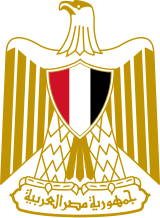You can help expand this article with text translated from the corresponding article in Arabic. (April 2019) Click [show] for important translation instructions.
|
The Egyptian Armed Forces (Arabic: القوات المسلحة المصرية, romanized: Al-Qūwāt Al-Musallahah Al-Maṣrīya) are the military forces of the Arab Republic of Egypt. The Chief of Staff of the Armed Forces directs (a) army field forces (armies and districts), without any separate Egyptian Army headquarters; (b) the Egyptian Navy, (c) Egyptian Air Force and (d) Egyptian Air Defense Forces.[6]
All branches, forces, armies, regions, bodies, agencies and departments of the Armed Forces are subject to the leadership of the Commander-in-Chief of the Armed Forces, who simultaneously holds the Ministry of Defence. This position is currently held by General Abdel Mageed Saqr (since July 2024),[7] Commander-in-Chief of the Armed Forces and Minister of Defense and Military Production. The only person above him in the leadership ladder is the Supreme Commander of the Armed Forces, who is the President of the Republic, and this position is currently held by Abdel Fattah el-Sisi. The Chief of Staff is Lieutenant General Ahmed Fathy Khalifa (since July 2024).[8] The Supreme Council of the Armed Forces consists of 23 members, headed by the Commander-in-Chief and Minister of Defense, and represented by the Chief of Staff of the Armed Forces, with membership of: Commanders of the main branches of air, navy, and air defense, commanders of the border guard forces, commanders of the armies (Second and Third), and commanders of the military regions (Central, Northern, Western and Southern) and the heads of the Operations, Armament, Logistics and Supply, Engineering, Training, Financial Affairs, Military Justice, Management and Administration, the directors of the Officers Affairs and Military Intelligence departments, the Assistant Minister of Defense for Constitutional and Legal Affairs, and the Secretary of the Council is the Secretary-General of the Ministry of Defense.[9][10]
Senior members of the military can convene the Supreme Council of the Armed Forces, such as during the course of the 2011 Egyptian revolution, when President Mubarak resigned and transferred power to this body on February 11, 2011.[11]
The armament of the Egyptian armed forces varies between eastern and western sources through weapons deliveries by several countries, led by the United States, Russia, France, China, Italy, Ukraine and Britain. Much of the equipment is manufactured locally at Egyptian factories. The Egyptian armed forces celebrate their anniversary on October 6 each year to commemorate the Crossing of the Suez during the October War of 1973.
The modern Egyptian armed forces have been involved in numerous military crises and wars since independence, including the 1948 Arab–Israeli War, Egyptian Revolution of 1952, Suez Crisis, North Yemen Civil War, Six-Day War, Nigerian Civil War, War of Attrition, Yom Kippur War, Egyptian bread riots, 1986 Egyptian conscripts riot, Egyptian-Libyan War, Gulf War, War on Terror, Egyptian Crisis, Second Libyan Civil War, War on ISIL and the Sinai insurgency.
- ^ a b IISS The Military Balance 2022, p. 337
- ^ IISS The Military Balance 2022, p. 336
- ^ "Military Factory". Retrieved 21 April 2020.
- ^ "Yearender 2018: Egypt's burgeoning domestic arms industry". Retrieved 2019-12-31.
- ^ "Arab involvement in Crimean War 'erased from history'". 2 March 2014.
- ^ "Egypt's military: Key facts". Retrieved 2017-04-12.
- ^ "Minister of Defence". www.mod.gov.eg.
- ^ "Chief of Staff of the Armed Forces". www.mod.gov.eg.
- ^ "الرئيس منصور يصدر قرارًا بإعادة تشكيل المجلس الأعلى للقوات المسلحة - بوابة الأهرام". 2019-04-14. Archived from the original on 2019-04-14. Retrieved 2024-06-14.
- ^ "الحياة - مصر: قرار جمهوري بتشكيل المجلس الأعلى للقوات المسلحة برئاسة وزير الدفاع". 2014-02-28. Archived from the original on 2014-02-28. Retrieved 2024-06-14.
- ^ Murdock, Heather (February 11, 2011). "Crowds rejoice as Egypt's Mubarak steps down, hands power to military". The Washington Times. Retrieved February 11, 2011.

